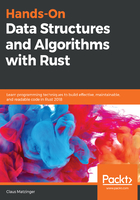
Linking and interoperability
Rust compiles to native code like many other languages, which is great because it expands the available libraries and lets you choose the best technology to solve a problem. "Playing nice with others" has always been a major design goal of Rust.
Interoperability on that level is as simple as declaring the function that you want to import and dynamically linking a library that exports this function. This process is largely automated: the only thing required is to create and declare a build script that compiles the dependency and then tells the linker where the output is located. Depending on what type of library you built, the linker does what is necessary to include it into the Rust program: static or dynamic linking (the default).
If there is only one native library that is to be linked dynamically, the manifest file offers a links property to specify that. Programmatically, it's very easy to interact with these included libraries by using the Foreign Function Interface.